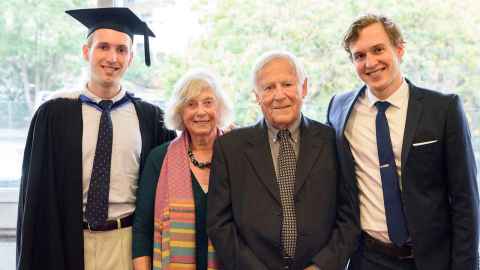Keith Sorrenson: supporting the strength of our history
1 September 2025
Professor Linda Bryder pays tribute to the late Emeritus Professor of History M.P.K. (Keith) Sorrenson.

I was one of the many students privileged to be taught in the University’s history department by Emeritus Professor of History M.P.K. (Keith) Sorrenson, who died on 26 July, aged 93.
As a teacher, Keith instilled in me, as he did with many other students, a passion for history and a respect for knowledge, evidence and critical thinking. He later became my valued colleague from 1988.
Keith was born in 1932 and identified with both his Māori (Ngāti Pukenga) and Pākehā heritage, shaping his lifelong scholarly interests in race relations and cultural interactions in New Zealand.
He grew up on a farm in upper Papamoa, Tauranga, and completed his masters degree at the University of Auckland in 1955. His MA thesis on the purchase of Māori lands from 1865 to 1892 was later described by historian Dame Judith Binney as a “pioneering work without parallel”.
Keith was a junior lecturer in the University’s history department from 1957 to 1958, after which he undertook his doctorate on African history at Oxford, graduating in 1962. He then went to Makerere University in Uganda from 1963 to 1964, furthering his research interests in colonial and inter-racial history. On returning to New Zealand, he took up a lectureship at Auckland in 1964, speedily being appointed to a chair in 1968, which he held until he retired to become an historical consultant for the Waitangi Tribunal in 1995. During his career he always sought to connect with scholars internationally, particularly in the UK, North America and Africa.
In 1997, the New Zealand Journal of History, of which Keith had been associate editor and then co-editor, produced a festschrift for him. This included a tribute from Professor Alan Ward, who, like Keith, had been central to the reappraisal of New Zealand’s colonial history, beginning in the 1970s. Alan noted that the 1960s and 1970s were exciting decades in which New Zealand history went from strength to strength and that, in their exploration of Māori-settler interactions, Keith, along with others such as Judith Binney, made significant contributions, both as teachers and researchers.
Keith also performed a conscience-of-society role as an active member of the Citizens Association for Racial Equality (president 1971–1973); he petitioned then-prime minister Norman Kirk in 1972 against a proposed Springbok Tour and joined protests opposing the 1981 visit.
In 1986 he was appointed a member of the Waitangi Tribunal and was a panel member on 14 tribunal inquiries, contributing immensely to the writing of many tribunal reports.
Keith also instilled a passion for history in his son Richard, who undertook a PhD in the History of Science at Princeton University before returning to New Zealand and managing the University of Auckland Foundation and its endowment fund.
In Keith’s final book in 2014, Ko te Whenua te Utu/Land is the Price: Essays on Māori History, Land and Politics, which collected his formative essays in one place, he modestly pointed out that his is not the last word; that historians constantly ‘refashion’ history. He is right, but this does not belittle the enormous contribution he made to the historical endeavour.
Keith is survived by his wife Judith, their three children, three grandchildren and one great grandchild.
Professor Linda Bryder
This article first appeared in the September 2025 issue of UniNews.